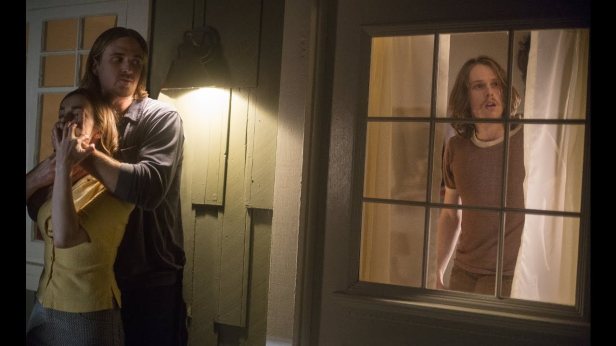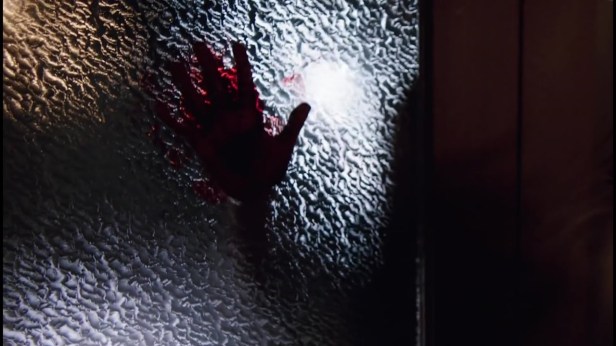When it first opened, Wolves at the Door caused plenty of wailing and howling of outrage at its supposed tastelessness, being yet another film in America’s ongoing fascination with deranged cult leader, failed pop star and instigator of brutal murder in the name of race war Charles Manson. Producers New Line Cinema and The Safran Company initially tried to distance themselves from the events at 10050 Cielo Drive on the night of 8-9 August 1969, stating ahead of its release that it was just another home invasion film set in 1969 and that Manson and his “Family” would not be mentioned. And that’s true enough, Manson isn’t mentioned until we see him in newsreel footage playing out under the end titles and the intruders at the house are mostly seen as shadowy, inhuman figures given no personality at all, the fact that Gary Dauberman’s script names his four main characters after the victims of the Tate murders – and explicitly namechecks them in a final photo montage – betrays that fiction. The use of the real Manson at the end of the film is the really exploitative moment but in truth the film has a lot more wrong with it than questions of dubious taste.
Directed by John R. Leonetti, he of such gems as Mortal Kombat: Annihilation (1997), The Butterfly Effect 2 (2006), Annabelle (2016), Wish Upon (2017) and The Silence (2019), it starts in 1969 with a double murder of freshly minted characters John (Chris Mulkey) and Mary (Jane Kaczmarek) before picking up with pregnant actress Sharon (Katie Cassidy) and her friends Jay (Miles Fisher), Wojciech (Adam Campbell) and Abigail (Elizabeth Henstridge) gathering to celebrate the latter’s imminent return to Boston. Their party is disturbed by a group of intruders who murder a visiting guest, Steven (Lucas Adams) before the attackers burst in to torment and harass them, picking them off one by one.

There have been plenty of films inspired by Charles Manson and the murderous exploits of his followers – indeed an entire industry seem to be cranking then out at a regular rate in the 1970s and 80s and one might have hoped that the obsession with the odious creep would have petered out by the turn of the millennium. Wolves at the Door was the last film based on Manson to be made before his death in 2017 but his malign influence seems to be living on – Daniel Ferrand’s The Haunting of Sharon Tate (2019) was much tackier than Leonetti’s film and summer 2019 saw the release of Quentin Tarantino’s Once Upon a Time in Hollywood which gave us an “alternate universe” version of Manson (played by Damon Herriman).
Wolves at the Door grafts the real life horrors of the Tate murders onto a bog standard home invasion thriller, full of stock horror scares – hands clutching at the heroine through a window, loud synthesizer bangs, everything underlit to the point of impenetrability – that plays fast and loose with the established facts to a degree that leaves you wondering why they bothered to evoke the names of the victims in the first place. And it’s not as if it’s even a particularly good home invasion thriller – it’s strictly by the numbers stuff, not particularly well made or acted. The only new wrinkle it has is the spurious Manson connection so one can see why they felt the need to add it, possibly aware that it would rattle a few cages and bring with it some much-needed publicity.

And to a point, one can see what the film’s detractors were saying. Using the murders as a selling point to lift a dreary, run of the mill horror film is tacky in the extreme and the decision to change the events of that night to fit in with the conventions of the genre make for an uncomfortable watch. Dauberman and Leonetti clearly have no respect whatsoever for the people whose tragedies they are exploiting and that anyone – them, their producers, the executives at the studios – thought that any of this was a good idea beggars belief. That said, one has to question how long the world needs to wait before making changes to atrocities is deemed “acceptable”. There have been countless films based on the Jack the Ripper murders that have posited all manner of wild theories and changed the names of just about everyone involved. And yet they rarely receive the kind of hatred thrown at Wolves at the Door.
Had they changed the names and just left it as an under-achieving home invasion film, Wolves at the Door would have come and gone with barely anyone noticing it. It’s too dull and derivative to have made itself felt among the dozens of similar title cluttering up the streaming services but the misguided attempt to spice things up by lashing it to a real life tragedy just gave critics another stick to beat it with. They didn’t need one to be honest – the film is bad enough in its own right and thoroughly deserves a good drubbing for being so badly made and unimaginative.